I don't know. Let's bench! ...on Windows cause that's what i had handy. CPU is Core i7-3770K.
.NET Core Web API (v2.1.3, middleware is whatever dotnet new webapi wires up) —
public class ValuesController : Controller
{
public IEnumerable<string> Get()
{
return new string[] { "value1", "value2" };
}
}
Azure Functions script host (v2.0.11587.0) —
// run.csx
public static IEnumerable<string> Run(HttpRequest req)
{
return new string[] { "value1", "value2" };
}
// host.json
// Default "consoleLevel" is verbose which blocks on flushing stdout,
// performance suffered unnecessarily so i switched to "error".
{
"tracing": {
"consoleLevel": "error",
"fileLoggingMode": "debugOnly"
}
}

Results:
// .NET Core Web API
C:\lab\bomb>bombardier-windows-amd64.exe -n 654321 http://127.0.0.1:5000/api/values
Bombarding http://127.0.0.1:5000/api/values with 654321 requests using 125 connections
654321 / 654321 [===================================] 100.00% 23s
Done!
Statistics Avg Stdev Max
Reqs/sec 27744.21 6713.91 124074.44
Latency 4.45ms 200.44us 46.97ms
HTTP codes:
1xx - 0, 2xx - 654321, 3xx - 0, 4xx - 0, 5xx - 0
others - 0
Throughput: 6.69MB/s
// Functions script host with .csx
C:\lab\bomb>bombardier-windows-amd64.exe -n 654321 http://127.0.0.1:7071/api/HttpTrigger
Bombarding http://127.0.0.1:7071/api/HttpTrigger with 654321 requests using 125 connections
654321 / 654321 [===================================] 100.00% 5m31s
Done!
Statistics Avg Stdev Max
Reqs/sec 1976.64 181.69 4213.32
Latency 63.23ms 20.74ms 2.12s
HTTP codes:
1xx - 0, 2xx - 654321, 3xx - 0, 4xx - 0, 5xx - 0
others - 0
Throughput: 492.23KB/s
I did a test run with precompiled functions (.DLL) as well, for the sake of science, both on v2 (.NET Core) and v1 (.NET Full Framework) runtime.
TL;DR
.NET Core Web API (v2.1.3): 27744 requests/sec
Functions script host (v2.0.11587.0) .csx: 1976 requests/sec
Functions script host (v2.0.11587.0) precompiled DLL: 2062 requests/sec
Functions script host (v1.0.11535.0) precompiled DLL: 4734 requests/sec
YMMV. Things may look different if you actually crunch some IO not just return 16 bytes on the wire from memory. But it is what it is. If you don't need the extra goodies Functions give you, go raw dotnet.
